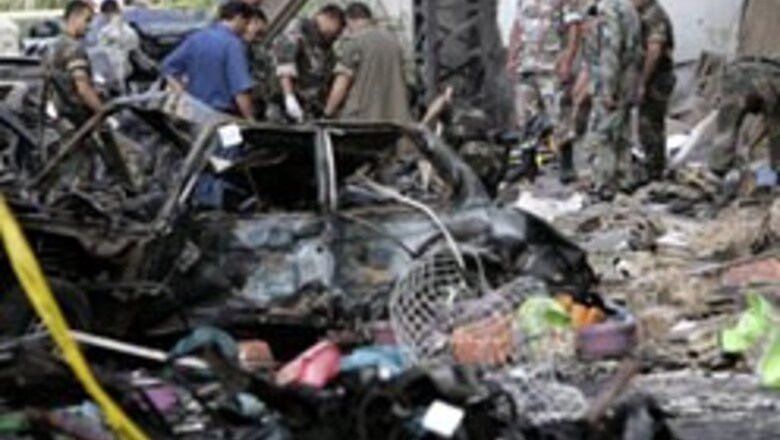
views
Beirut (Lebanon): A bomb ripped through a vocal anti-Syrian lawmaker's car near the popular waterfront in the Lebanese Capital on Wednesday, killing him and nine other people in the latest assassination of a Lebanese opponent of Damascus.
The blast, a new blow to the stability of this conflict-torn nation, comes days after the government began putting together an international tribunal ordered by the United Nations to try suspects in the killing of former Prime Minister Rafik Hariri in Beirut two years ago - a move strongly opposed by Syria and its allies in Lebanon.
The slain lawmaker, Walid Eido, was a prominent supporter of the tribunal and a close friend of Hariri. He is the seventh anti-Syrian figure killed in Lebanon in the past two years, starting with the February 2005 death of Hariri in a massive Beirut suicide car bombing. Many Lebanese have accused Syria of being behind the slayings, a claim Damascus denies.
Eido's supporters quickly blamed Syria for Wednesday's bomb attack. Hariri's son, Saad Hariri, the leader of the anti-Syrian majority bloc in parliament, indirectly accused Damascus, saying ''agencies of evil'' seeking ''Lebanon's submission'' carried out the blast.
Lebanon's majority coalition, in a statement, accused Damascus directly.
''This crime is a clear message from the Syrian regime to Lebanon in response to the creation of the international tribunal,'' said a statement read by lawmaker Bassem Sabei.
Syria controlled Lebanon for 29 years until it was forced out after Hariri's assassination, and its Lebanese opponents believe it is seeking to regain domination by plunging the country into chaos.
Prime Minister Fuad Saniora declared a national day of mourning Thursday for Eido and the other victims. He also called for an emergency meeting of Arab foreign ministers and the international community to help in the investigation of the legislator's assassination.
''Lebanon and the Lebanese will not submit to terrorism or intimidation. We will not surrender to terrorism and we will triumph. Lebanon will survive,'' Saniora said in a televised speech Wednesday night.
The US - a major Saniora ally - also condemned the bombing.
''We stand with the people of Lebanon and Prime Minister Saniora's government as they battle extremists who are trying to derail Lebanon's march to peace, prosperity and a lasting democracy,'' Gordon Johndroe, the US National Security Council spokesman, said in Washington.
Asked if Washington saw Syria's hand in the attack, US State Department spokesman Sean McCormack said, ''I can't tell you at this point, but very clearly this is the work of those who intend or want to undermine Lebanese democracy.''
The slaying was likely to further enflame Lebanon's bitter power struggle between Saniora's Western-backed government and its Syrian-backed opponents, led by the Hezbollah militant group. Many fear the violence could push the polarized nation with a fragile balance of ethnic and religious groups into a new civil war.
Wednesday's blast also came as Lebanon is dealing with a separate conflict that threatens to spiral out of control: a nearly four-week battle with al-Qaeda-inspired militants barricaded inside a Palestinian refugee camp near the northern city of Tripoli. More than 140 people have been killed in the Lebanese army's siege of the Nahr el-Bared camp.
The bomb ripped through Eido's black Mercedes just before 6 p.m. on a narrow side street off the Beirut Corniche in Manara, a mainly Sunni Muslim sector of the capital where the 65-year-old Eido often went in the afternoons to play cards with friends.
The palm tree-lined boulevard along the Mediterranean shoreline is a favorite among Beirutis for evening strolls.
















Comments
0 comment